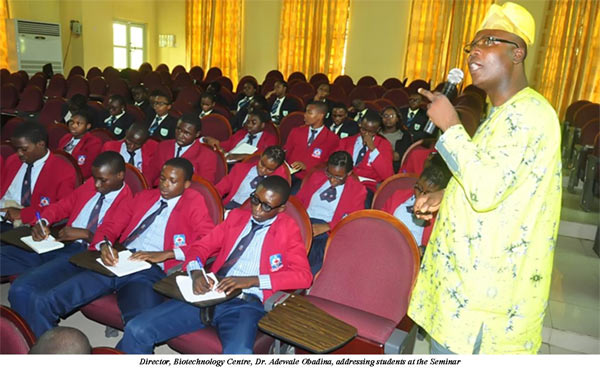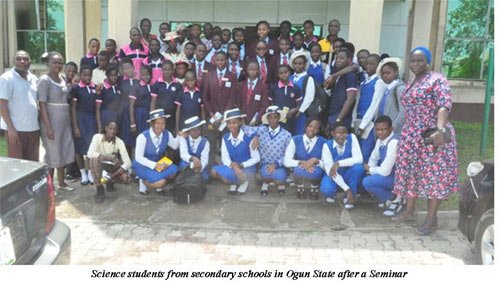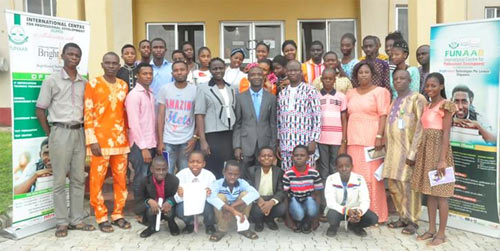The Director, Biotechnology Centre of the University, Dr. Adewale Obadina, has restated that Biotechnology is capable of ensuring food security in the 21st Century. Dr. Obadina gave the assurance at the commencement of the weekly Biotechnology Seminar for Science Students in Senior Secondary Schools in Ogun State.


According to him, “the United Nations Food and Agricultural Organisation (FAO), has predicted that by 2050, we would need to feed a world population of 9.1 billion people. This requires raising food production by approximately 70 per cent”. It is in the light of this forecast that food Biotechnology would come to the rescue. The Don added that Biotechnology could be applied through the development of disease-resistant plants, plants that reduce environmental burden of fertilizers, food crops that could produce greater yields, increasing nutrient in plants such as vitamins and genetically-engineered bacteria that could degrade environmental pollutants.

Dr. Obadina stated further that other areas that Biotechnology could help solve life problems include detection of forensics, DNA finger-printing, gene therapy, transgenic crops, animals and DNA tracking of seeds, aquaculture, bioremediation and bioextractions, bioinformatics, tissue culture among others. The Director explained that the goal of the weekly seminar was to introduce teams of high school students and adult leaders to concepts such as DNA extraction, genetic engineering and recombinant DNA technology, saying “We want to educate our youths to be able to make educated and informed decisions about what Biotechnology is all about and its uses, rather than having misconceptions, based on fear and emotion”. While calling the youths, who are the future scientists and decision-makers, Dr. Obadina observed that in 2017, the Biotechnology Centre was planning to organise series of hands-on activities including the extraction of DNA from students’ saliva, fruits, and blood.

Speaking after one of the sessions, Miss Ayeni Adeogo, a Senior Secondary School III student of Stephen Centre International School, Obantoko, Abeokuta, said Biotechnology was very useful in the life of human beings, particularly, in the areas of genetics and forensic analysis (to determine the cause of death of plants and animals). She recommended the use of Biotechnology to solve human problems or challenges, because it cuts across every field of human existence, in the sense that it remained the science that unravels a new lease to life; be it in the medicine, agriculture, the food we eat, the drugs we take, data recording, our alignment with other species on earth or security of life and properties.

Some of the schools that attended the seminar are: Federal University of Agriculture, Abeokuta International School (FUNIS); Deeper Life High School, Abeokuta Campus; Emmanuel College, Obantoko; Stephen Centre International School, Obantoko; Nawair-Ud-Deen Grammar School, Obantoko; and Aminat International College, Obantoko; all in Abeokuta, Ogun State. Venue of the free seminar is the Postgraduate School Auditorium of FUNAAB, every Wednesday between 10am and 1pm, till the end of the year. About 75 students from five schools are expected in all, every week, throughout the sessions, which would cover both lectures and video presentations on Biotechnology techniques.
In another development, the Deputy Vice-Chancellor (Development), Professor Ololade Enikuomehin, has charged youths of today to utilise the potentials and opportunities at their disposal positively, describing their generation as lucky and fortunate. Speaking during the Graduation/Send-forth, organised by the International Centre for Professional Development (ICPD) of the University for the 2016 Summer School Programme, Professor Enikuomehin encouraged the youths to continue learning by using the computer on a daily basis.
Represented by Mr. Charles Akinola of the Centre, the DVC (Development), however, advised the graduands to avoid using the computer to commit fraudulent acts, play unnecessary games or watch bad films, noting that the computer was more useful than being deployed for such things. Professor Enikuomehin highlighted the benefits of the two-month information technology training to include creating awareness and job opportunities to make the youths employable and job-creators. He added that the training was also designed to help discover and develop their potentials, keep them busy during the holidays and reduce the likelihood of engaging in social vices.
The Head of ICPD, Mr. Lawrence Kazeem, said the desire of the Centre was for its students to graduate to higher level of advancement after the IT training. He charged them not to waste the lessons gained, as he also implored them to develop their capacities through knowledge. Speaking on behalf of the graduands, Oluwasegun Ayomidipupo, said they had learnt a lot from the training, having been equipped with the requisite knowledge while thanking the University Management for creating a conducive environment for ICPD to function properly.
